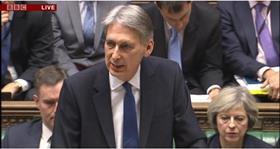
Philip Hammond’s first budget as chancellor has sparked a mixed reaction from the food and drinks industry, with the leading industry bodies welcoming business rates caps and commitments to boost R&D, but opposing National Insurance rises for the self-employed.
One of the main announcements affecting the industry from Hammond’s spring budget was that business rate rises would be capped, with the chancellor facing recent criticism over rises due to come into force when premises are re-evaluated.
Business rates
In his budget, the chancellor announced a £435m support package for firms affected by business rates increases, including a £300m hardship fund for those worst hit.
Rate hikes for businesses that lose existing relief will be capped at £50 a month.
The CLA, which represents landowners, farmers and rural businesses across England and Wales, welcomed the introduction of a cap but pointed out that it was “not the same as the 100 per cent discount we called for.”
“We believe the chancellor has listened to us,” said CLA president Ross Murray. “He is taking action to help those small rural businesses which, as a result of the 2017 revaluation, no longer qualify for rates relief.”
But he said he was “keen to see the details of the fund for discretionary relief as it is important this leads to opportunities for rural councils to help the worst affected rural businesses.”
Helen Dickenson of the British Retail Consortium, was less enthusiastic about the changes, saying: “We hope that the relief measures will help some of those businesses hardest hit by the revaluation, albeit only temporarily.
“More short term relief measures continue to add complexity to an already impenetrable system. £435m is a drop in the ocean compared with the £25 billion a year that the tax raises.”
NI contributions for self-employed
The chancellor’s announcements on National Insurance contributions, meanwhile, were a cause for concern among self-employed growers and farmers. The rate of Class 4 National Insurance contributions for the self-employed is set to increase from nine to 10 per cent in April 2018 and then by a further percentage point in April 2019.
Class 2 National Insurance, a separate contribution for self-employed workers that make a profit of over £5,965 a year, will be abolished as planned in April 2018.
Taken together, the measures will mean millions of self-employed workers could pay an average of £240 a year more.
NFU president Meurig Raymond reacted to the announcements on tax contributions, saying: “There were few measures in today’s budget to help create an environment that supports profitable, progressive and competitive farm businesses.
“The rise in National Insurance Contributions for the self-employed… will have a detrimental impact for farmers. The NFU is striving to make government aware of the implications this will have on the sector.”
“Many farmers will feel that this Budget was a missed opportunity, particularly that the Chancellor did not see fit to extend capital allowances as part of the government’s productivity plans. Farming needs to invest to increase productivity so it can compete post-Brexit.”
R&D
In research and development the Treasury announced the initial phase of its ‘Industrial Strategy Challenge Fund’, a scheme to support groundbreaking technologies being developed by British companies and universities.
However, a pledge to fund £270m of research in “disruptive technologies” such as robotics, next-generation batteries and biotech was dismissed by some in the tech industry as being inadequate, The Telegraph reported.
Some £250m has also been earmarked for a National Productivity Investment Fund to “build a pipeline of highly-skilled research talent' in areas of research that could benefit the fresh produce industry.
Additional funding of £90m will be invested in 1,000 PhD places in science, technology, maths and engineering, while a further £160m will be set aside for fellowships for early and mid-career researchers in these areas.
Ian Wright, the director general of the Food and Drink Federation (FDF), said he was “pleased to see productivity and innovation at the heart of [the] budget”, stressing the importance of the industry’s access to a skilled workforce.
“Access to a skilled workforce is particularly pressing for food and drink manufacturing as we require an additional 130,000 new recruits by 2024,” he said. “It is important that food and drink manufacturing as a sector is fully recognised in the new technical qualifications and we look forward to being closely involved in their implementation.
“It was also pleasing to see details of how the £4.7 billion from the National Productivity Investment Fund announced at autumn statement will be invested in science and innovation.
“A number of global food and drink companies have already chosen to base their R&D centres here and we want the UK to be the number one location of choice for others too.”
Sugary drinks
One area of the budget that the FDF does continue to oppose is the Soft Drinks Industry Levy, which was officially announced on Wednesday after months of debate.
An 18p tax will be applied to drinks with 5g of sugar per 100ml, with Coca Cola, Irn Bru, Red Bull and Dr Pepper set to see an 8p price increase by April 2018 in the battle against childhood obesity.
Wright said: “We continue to oppose the Soft Drinks Industry Levy because of its undue focus on sugar (as opposed to calories) and because there is no evidence that it will reduce obesity. We continue to believe that implementation of the levy should be paused while such good progress is being made voluntarily.”



